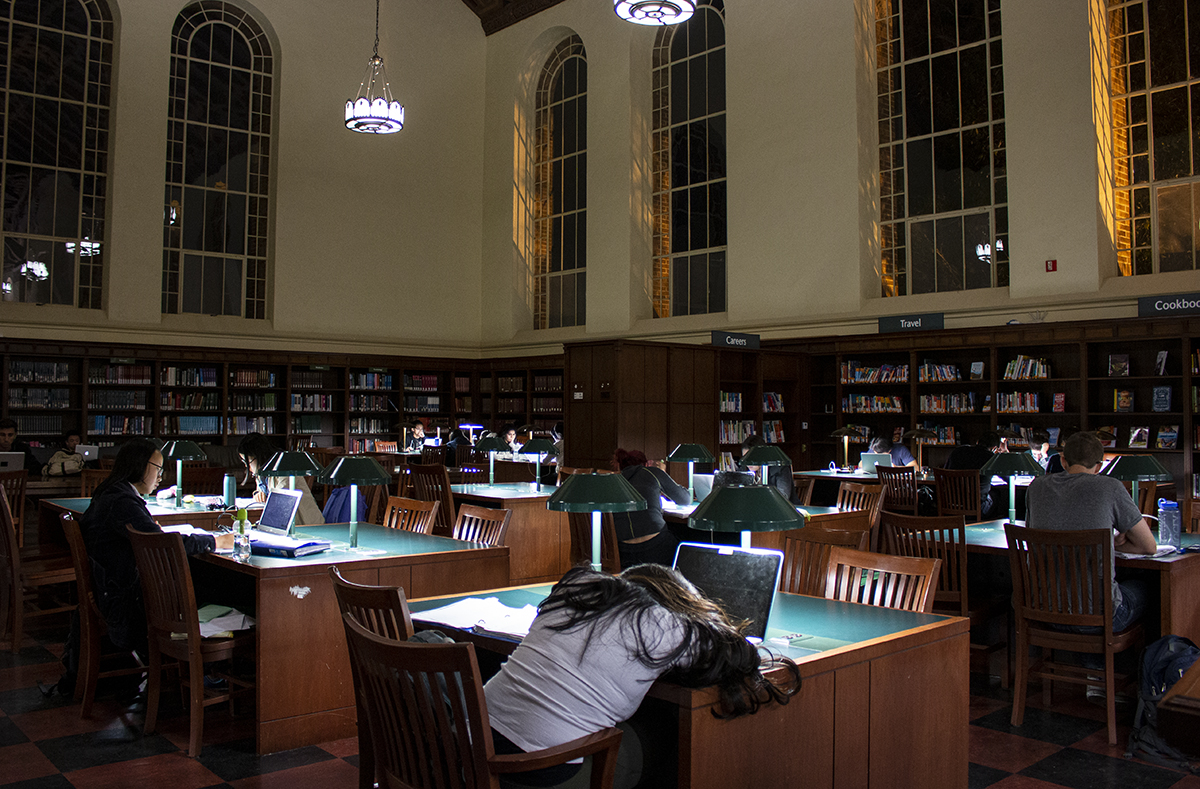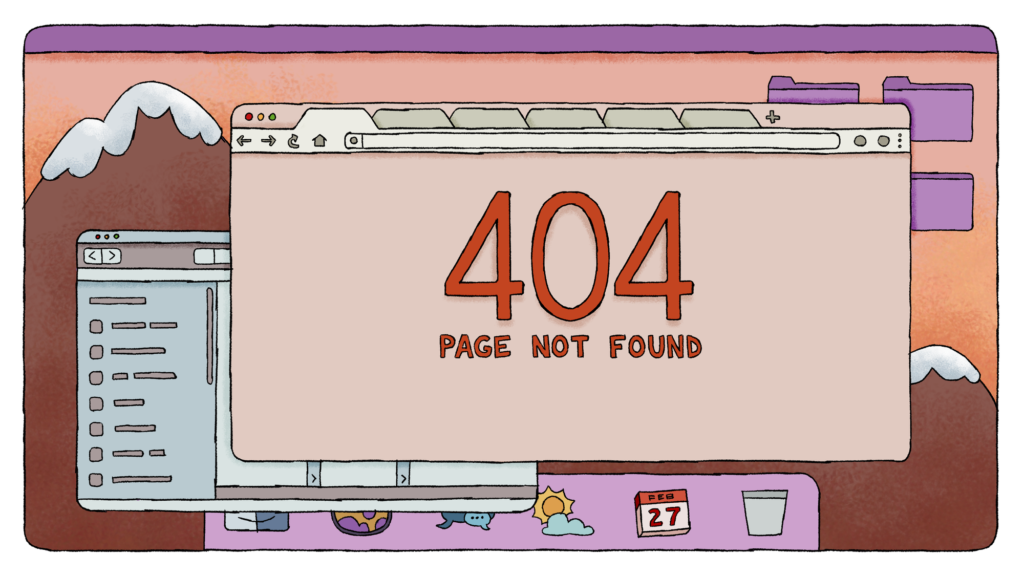404 Not Found: UCLA must better communicate, provide research resources for undergraduates

Students studying in Powell Library. Research can be difficult to navigate for undergraduates. However, this doesn’t have to be the case. UCLA should help prospective student researchers take advantage of all the university has to offer by publicizing resources and hiring more faculty. (Daily Bruin file photo)
By Ashley Leung
Feb. 21, 2022 3:20 p.m.
“404 Not Found” is a series by Ashley Leung, an Opinion columnist studying education studies and English. These columns will explore the personal experiences of students and professors who have juggled the triumphs and frustrations of academic research. As research often warrants endless questioning and reflection, this series seeks to unveil, if not alleviate, the existential dread of researchers and academics in both humanities and STEM fields as they inevitably attach themselves to the value and significance of their work. Under the assumption that there will always be unanswerable academic and personal questions, readers are encouraged to nurture their self-worth as they navigate through college and beyond.
Sometimes, we don’t know who to ask the questions we’re full of.
Other times, we don’t even know what our questions are.
For undergraduate students at a university overflowing with research, it initially seems that the world is our oyster. Our costly tuition must be benefiting us in some way, right?
However, fresh out of high school or community college classrooms that focus more on academic instruction and less on academic research, if at all, many undergraduates may not know where to begin when it comes to research.
As an institution that prides itself in being a top research university, UCLA must value and nurture emerging researchers and their research interests. Increasing the accessibility and sufficiency of undergraduate research resources and faculty support would ensure quality research opportunities for every Bruin.
With research workshops offered by UCLA libraries, seminar courses for student-initiated research projects and funded research programs such as the Undergraduate Research Scholars Program, Undergraduate Research Fellows Program and McNair Research Scholars Program, research opportunities seem to be right at our fingertips.
But UCLA’s publicity of these resources is insufficient, with many students unaware of these opportunities until they fatefully encounter them as upperclassmen.
This was the experience of Ahmet Dikyurt, a fourth-year anthropology and psychology student currently conducting two research projects under the anthropology department. One is on the transgenerational trauma of Bosnian Americans, and the other is on various native languages’ correlation to views of gender identity.
Dikyurt only discovered the possibility of student-led research in his third year when he randomly encountered a Handshake listing for a lab position, which prompted him to look into more research opportunities.
And even when students do become interested in research, knowing where to start is often the biggest hurdle.
“(UCLA) is such a big institution, and we have so many resources, and that’s amazing,” said Ragini Srinivasan, a second-year mathematics/economics and political science student. “But sometimes it can also just feel very overwhelming, and you have no idea how to get started.”
Having assisted three political science professors with their research projects, she is now part of URFP, through which she is conducting her own research project on the connection of decentralized currencies to countries’ economic and political instability.
Undergraduates who want to conduct research must express their interest in and commitment to such an endeavor, and, admittedly, there are numerous benefits as doing so can cultivate independent thinking and self-determination after years of rigid K-12 education.
“It’s important for us as researchers to take initiative, but I think the difficult part just comes back to just not knowing what we don’t know,” said Stephanie Perez, a fourth-year international development studies student. Perez is currently doing a departmental honors research project under the UCLA International Institute on the urban and rural discrepancies of the maldistribution of dental practitioners in South Africa.
Another hurdle many undergraduate researchers face is finding a suitable faculty mentor for their research projects.
For life and physical sciences students, the Student Research Program requires mentors to be ladder-rank faculty, meaning they must be tenured or on the tenure track.
For humanities, arts and social sciences students, the policy is slightly more lenient. Adjunct professors and lecturers can mentor with the approval of their chair.
Tenured faculty have been consistently favored for undergraduate research, which is understandable considering these professors have more research experience and work stability.
However, with only about 23% of UCLA’s faculty being ladder-rank, this makes students’ choices severely limited. Not to mention, students sometimes build more meaningful connections with nontenure track faculty such as lecturers and postdoctoral scholars.
Srinivasan added that before she connected with her current faculty mentor, she just cold-emailed professors.
“That was definitely kind of daunting and disappointing because, you know, a lot of the time professors are just so busy and can’t respond to every email they get,” Srinivasan said.
I had a similar experience finding a faculty mentor for my research project on Asian American literature. There were only four professors in the English department teaching the topic, and all except one were either too occupied to mentor or deemed my research irrelevant to their studies.
I was lucky to find even one professor willing and able to take me on.
Perez, on the other hand, said she had to bounce between UCLA’s community health sciences, dentistry and African studies departments before finding her mentor, and that many professors didn’t know enough about her specific study.
She added that she wishes she had known earlier on that it’s okay to not have a mentor who is a perfect fit. It would’ve made her search much easier.
Fortunately, many faculty are still eager to support undergraduate research students.
Of all the faculty she has met, even those unavailable to mentor were open to meeting with her to provide suggestions, Srinivasan said.
Nonetheless, hiring more faculty members would ensure long-term improvement of the attention undergraduates receive.
Research is a fulfilling process that yields a fruitful result, similar to pregnancy and childbirth – minus the labor pains.
It allows you to converse deeply with those who share the same interest and passion, Perez said. Even though her research will not amount to tangible results, Perez added that she is satisfied knowing she did her best contributing to what could become tangible as her field grows.
“I think the idea of just contributing to all the knowledge that exists in the world is really, really beautiful,” Srinivasan said. “I at least love the idea of potentially being a professor and getting students involved in my research and allowing them to learn outside of the classroom because, inside the classroom, learning is very limited.”
Not only can research expand our worldly knowledge, but it can also be introspective and self-revealing.
Who am I, and what is my position in this world?
Research is a process of answering such questions.
With increased support and guidance from UCLA and its faculty and staff, more undergraduate students will hopefully step into the perplexing yet fulfilling world of research.



